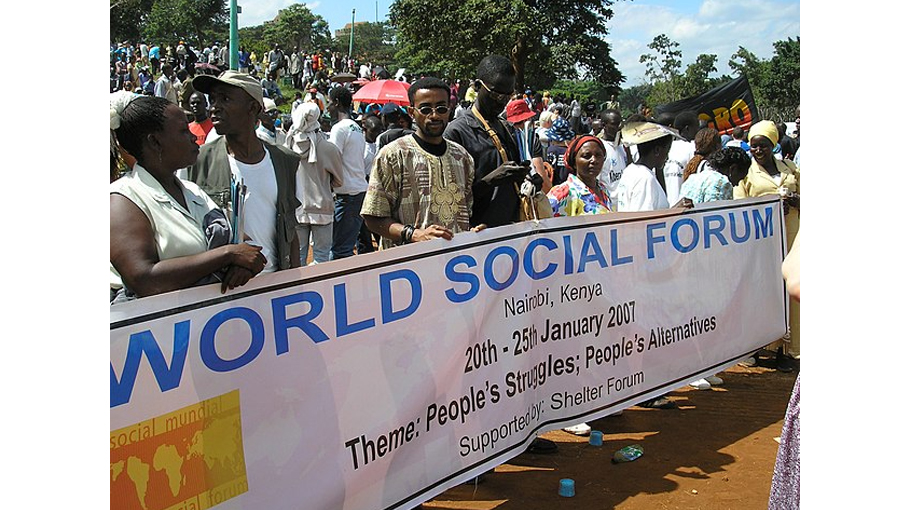A new start for the world social forum

On the surface, things look very good. Trees are covering more and more areas. In pictures from above, the Himalayan valleys are green, two-thirds forest. But 90 per cent are conifers. Below them there is hardly any vegetation, biodiversity is being lost, the soil is becoming more and more sterile, dry, unusable and unable to store water. The Himalayas are rapidly becoming what is known as a green desert. There is also less and less snow. This is accelerating the melting of the glaciers.
2 billion people depend on these glaciers for water through the great rivers Indus and Ganges to the Mekong and the Yangtse rivers. As the glaciers shrink, there is less and less water for agriculture downstream. Small farmers are drastically affected. Many others also depend on the water from what is called the top of the world.
In one of the Himalayan valleys, surrounded by 7 500 metre peaks, lies Nepal’s capital, Kathmandu. Here, a meeting was recently held that could show us the way out of this crisis, a way based on the needs of small farmers and rural areas. The person who did more than anyone else to convince the International Council that this year’s World Social Forum should take place in Nepal may well have been the political sociologist Uddhab Pyakurel. He belongs to the first generation in his village to become literate. WSF changed his entire perspective on life. The social forums he attended, and his encounters with the people there, gave him an awareness of everything from neoliberalism to the importance of combating discrimination. He gained so many new perspectives and ideas. With particular empathy, he tells the story of a Finnish professor he met who had reduced his job to work as a cleaner. In the traditional Nepalese village society, with its caste system, each individual is assigned a specific task from birth and must stick to it for the rest of their lives. Uddhab Pyakurel’s encounter with a person who performed an intellectual occupation while scrubbing floors was shocking. His view of village social systems changed completely. By organising the WSF in Nepal, he hoped that a large number of the participants would similarly broaden their horizons. He believes that something similar also happened. Although many came to the WSF in Kathmandu in the context of specific NGO projects, many of them were affected in the same way as he was.
The first World Social Forum was held in Porto Alegre, Brazil, in 2001. The first decade was a success as a counterweight to neoliberal globalisation. Over a hundred thousand participants were able to gather year after year at global meetings. Soon enough, forums emerged on most continents, in many countries and even locally as in Sweden. Then the influence declined until Covid-19 made it impossible to hold anything other than an online forum. Now the World Social Forum is re-launching with what even critics see as a success.
The criticism has been that peace issues have been overlooked and that environmental issues have been overshadowed by social issues. The WSF in Kathmandu demonstrated a clear commitment to peace and that environmental and social issues can be given a proper place at the same time. Soumya Dutta of Friends of the Earth India, a network of fishermen, street vendors and other environmentalists, goes so far as to say: “Environmental and social issues are becoming one issue. This is done through things like making the working conditions of those who have to work in increasingly extreme heat as porters a natural part of climate justice efforts.”
Criticism has also centred on the difficulty of the WSF leading to action. An almost antagonistic conflict has prevailed between the advocates of the open space and those who wanted more political mobilisation. In Kathmandu, several pragmatic ways were tried to encourage political action without changing the rule that the WSF is an open space that does not make decisions in the name of all participants.
The newly established WSF World Assembly of Resistance was one way to channel this will. Another was for members of the International Council, and not the whole Council, to adopt a statement condemning Israel’s genocide in Gaza and calling for a joint day of action on 15 May. A third was to use the forum to launch what cannot be done in the framework of social forums, such as cooperation between parties and popular movements against the emerging right-wing extremism.
Can the WSF in Nepal provide a new momentum for international civil society cooperation and strategies? In a country facing the dramatic consequences of global warming and with many farmers, the opportunities may be there. Central to the climate justice movement and many other movements is recognising the central role of rural socio-economic realities and farmers. It is also the ability to shape strategies that change countries’ policies. Nepal is one of the few countries or the only that has written food sovereignty into its constitution, so one of the central demands of the global peasant movement has been adopted by this nation: the right of every nation to feed its own people. It is also a nation that has avoided the authoritarian tendencies that are so prevalent in so many other countries in Asia and now in Europe and many other parts of the world. Who knows, maybe the WSF in Nepal will be the start of a new momentum that makes rural movements as important as urban movements in solving the problems of the world today?
Tord Bjork works with Friends of the Earth Sweden, International Peace Bureau and Vasudhaiva Kutumbakam.
Source: CounterPunch


